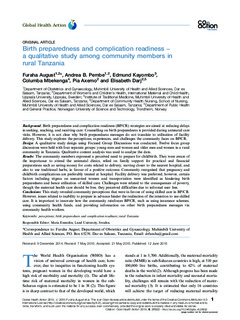| dc.description.abstract | Background: Birth preparedness and complication readiness (BP/CR) strategies are aimed at reducing delays
in seeking, reaching, and receiving care. Counselling on birth preparedness is provided during antenatal care
visits. However, it is not clear why birth preparedness messages do not translate to utilisation of facility
delivery. This study explores the perceptions, experiences, and challenges the community faces on BP/CR.
Design: A qualitative study design using Focused Group Discussions was conducted. Twelve focus group
discussions were held with four separate groups: young men and women and older men and women in a rural
community in Tanzania. Qualitative content analysis was used to analyse the data.
Results: The community members expressed a perceived need to prepare for childbirth. They were aware of
the importance to attend the antenatal clinics, relied on family support for practical and financial
preparations such as saving money for costs related to delivery, moving closer to the nearest hospital, and
also to use traditional herbs, in favour of a positive outcome. Community recognised that pregnancy and
childbirth complications are preferably treated at hospital. Facility delivery was preferred; however, certain
factors including stigma on unmarried women and transportation were identified as hindering birth
preparedness and hence utilisation of skilled care. Challenges were related to the consequences of poverty,
though the maternal health care should be free, they perceived difficulties due to informal user fees.
Conclusions: This study revealed community perceptions that were in favour of using skilled care in BP/CR.
However, issues related to inability to prepare in advance hinder the realisation of the intention to use skilled
care. It is important to innovate how the community reinforces BP/CR, such as using insurance schemes,
using community health funds, and providing information on other birth preparedness messages via
community health workers. | nb_NO |
| dc.description.localcode | © 2015 Furaha August et al. This is an Open Access article distributed under the terms of the Creative Commons Attribution 4.0 International License, allowing third parties to copy and redistribute the material in any medium or format and to remix, transform, and build upon the material for any purpose, even commercially, provided the original work is properly cited and states its license. | nb_NO |
